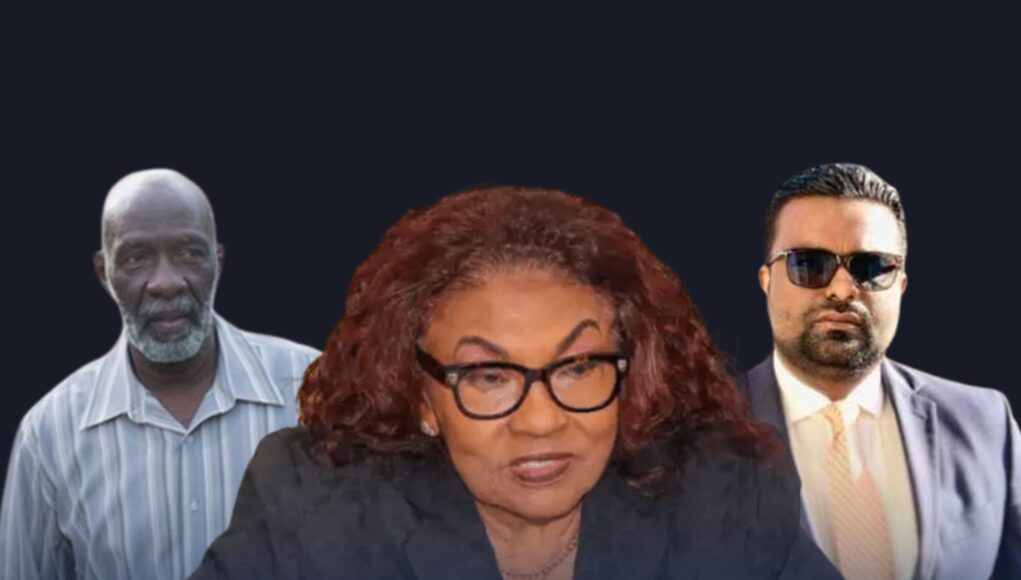By Abena Rockcliffe
Questions regarding the impartiality of Guyana Elections Commission (GECOM) Chair, Justice retired Claudette Singh, continue to dominate public conversations.
Recently, Guyana Standard conducted interviews with political operatives sitting on the commission—Vincent Alexander and Sase Gunraj. While the answers given by those commissioners differ in their conclusion, accounts given, as to the procedural state of affairs at those commission meetings, are almost identical.
Both Alexander and Gunraj told Guyana Standard that most of Singh’s “rulings” are advantageous to the PPP/C.
Speaking about “rulings”, both sides agree that Justice retired Singh is unlike any other GECOM Commissioner in the way she executes her duty. The retired Judge has carried her courtroom practice into the walls of GECOM. She listens to the arguments, then “rules”.
It is the longest-serving GECOM Commissioner, Vincent Alexander who has been most vocal about Singh’s “partisan” behaviour. During an exclusive interview with Guyana Standard, Alexander said he has never witnessed such a one-sided chair.
It must have slipped Alexander to speak about the actions of the late Justice James Patterson during his short stint as Chair.
Alexander recalled that he served under two Chairs, Singh and Dr. Steve Surujbally. Alexander said that, unlike Singh, Dr. Surujbally sought consensus among commissioners. “In doing so, he was actively involved in the deliberations. Singh is quite different. She behaves judge-like. She sits, she listens, and hardly says anything during the course of discussions.”
Alexander said that Singh then “retires” and would return to the following meeting with a script ruling on the matter. “She actually uses the term ruling.” Alexander said that those rulings are almost always a reflection of the position articulated by government-nominated commissioners.
Alexander was asked whether he believes the then government faltered when appointing Singh to chair the commission. Was there insufficient due diligence?
He noted that Singh’s behaviour changed with the change of government. Alexander said that based on all he has witnessed, he suspects Singh has been compromised. Alexander expressed his belief that Singh is looking to retire but will continue her partisan behaviour until such time.
Gunraj has looked at the same “evidence” examined by Alexander. But he arrived at a different conclusion.
Gunraj told Guyana Standard that the record would show that Singh votes as she sees fit. He said the fact that there is “coincidence” in her voting with government-nominated commissioners does not equate to a compromised position.

Gunraj noted, as did Alexander, that commissioners on both sides of the divide put forward their arguments on a particular matter. He said that incidents of a divided commission have become more prevalent in recent times, requiring Singh to exercise her casting vote.
Gunraj said that elections, and most, if not all, of the issues antecedent to an electoral process are statutory. He said that the chair rules in accordance with the law. Gunraj, who is also a practicing attorney, noted that while there is much hullabaloo about Singh’s actions, her rulings are not being challenged in the courts.
“If the rulings are so abhorrent, any concerned stakeholder can petition the court. There is always the option of challenging in court. The few challenges put to the court have been resolved in the favour of GECOM,” Gunraj emphasized.
Gunraj said that Singh usually gives reasons for her rulings.
“She rules with reason, unlike what was given when her immediate predecessor (Justice retired James) Patterson voted without giving a reason and often times without listening to the arguments. It appeared as if he had a predisposed position on the issues,” Gunraj said.
Pointing to Surujbally, who adopted a nonpartisan style, Gunraj appeared unimpressed.
He said, “This much vaunted position of seeking consensus is interesting. Surujbally hardly voted, but he was accused of browbeating commissioners into consensus positions.”

Gunraj concluded, “Forcing consensus rather than expressing a view was more a matter of self-preservation rather than anything else.” In Gunraj’s view, Singh has been acting fairly and is not compromised.











